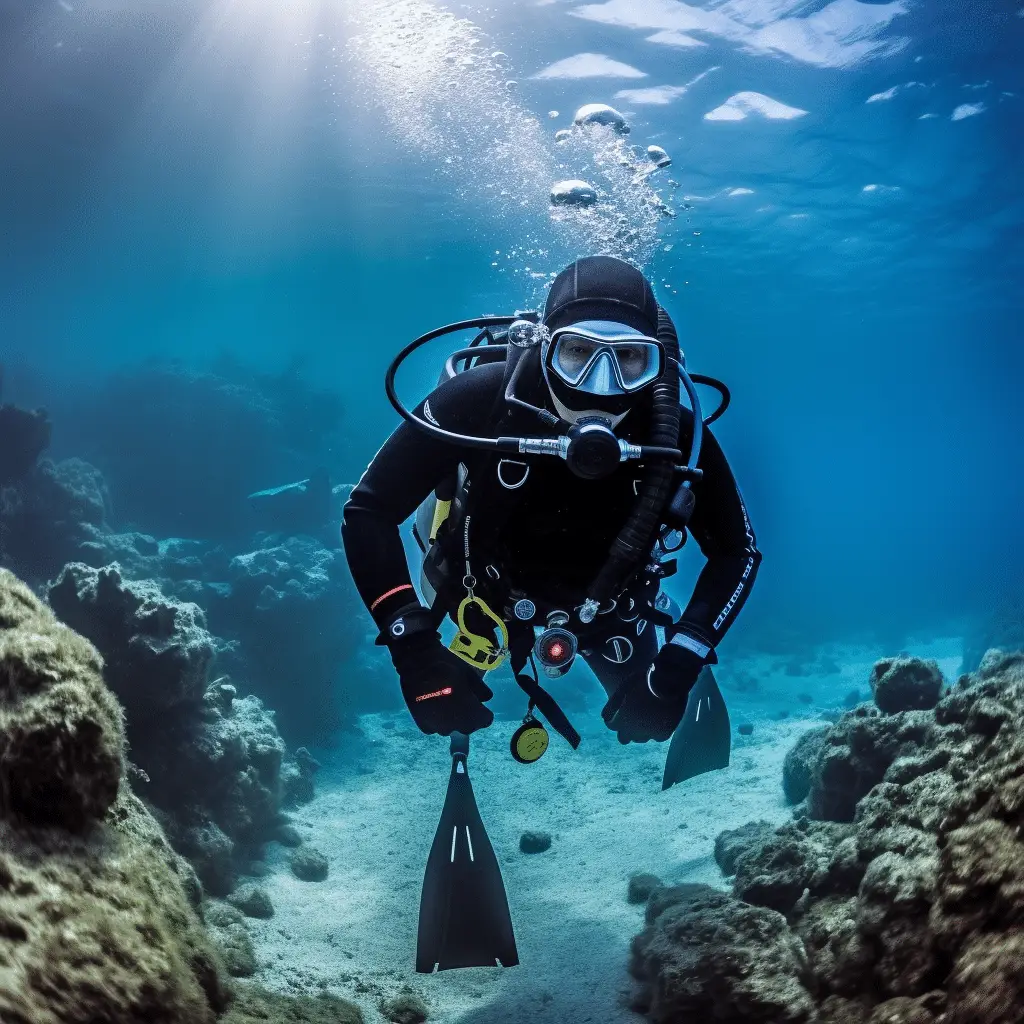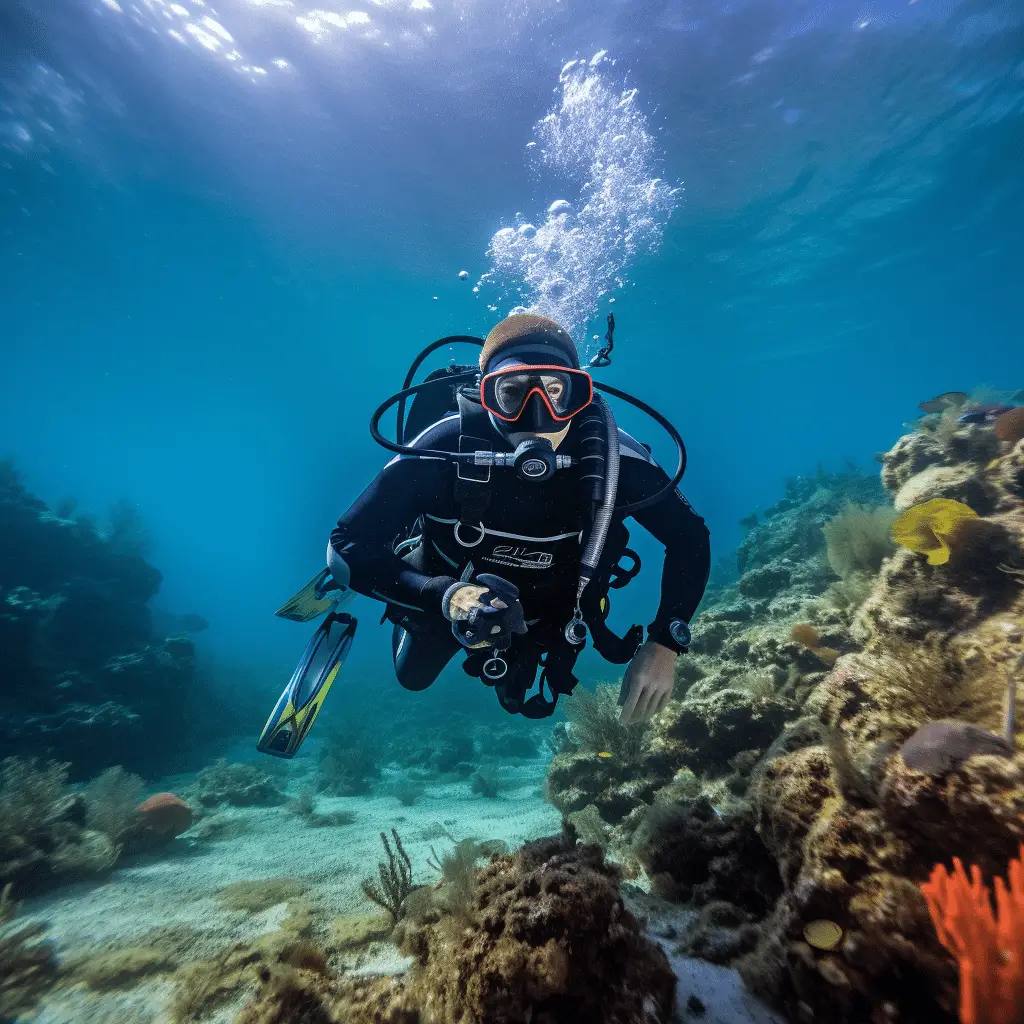Scuba diving and feel like your skills need some brushing up, this blog post is for you. It’ll provide 12 refresher tips that will help you brush up on the basics of diving so that next time you go out in the water, it’s just like riding a bike!
Regardless if you’re a newbie or a seasoned diver, it always helps to read a refresher about safety tips and diving guides. It’s a great reminder of the rules you have to follow to ensure that you’ll have an enjoyable plunge. So for this post, we took the time to write a short rundown of some scuba diving refresher tips you must keep in mind. Make sure that you read this one before your next dive!
1. Never hold your breath

Always follow the golden rule of diving: keep breathing! Holding your breath as you descend or ascend is a recipe for decompression sickness and poor equalization.
Remember that as you descend, your lungs contract due to pressure. When you go up, your lungs will expand back to their standard size. So when you hold your breath, your lungs will experience shock, and you stand the risk of lung explosion due to the sudden gush of air.
Also, breathing while scuba diving should be slower yet deeper than how you’ll do on land. Listen to the recordings of divers, and you’ll notice that the sound of the air takes longer on each inhales and exhales.
2. Practice B.W.R.A.F.
Diving is an exciting sport, but it can be risky. Dive buddies are essential when you’re diving because they make sure that your body and equipment are in good condition for the watery environment to enter into.
The Big Whales Rarely Attract Fish check is an acronym for a few essential procedures. It stands for Buoyancy, Weights, Releases, Air, Final Check and reminds divers of the importance of paying attention to their diving body’s condition when performing these tasks!
Diving buddies will go through a pre-dive checklist before they jump into the water. One important thing is that the other person can hear you, and this means that all air valves are connected and working. You should also attach weights, which will help if something happens underwater.
The best advice I could give new divers would have them do what we call “a drill.” This is where one person gives instructions while the other person does the tasks, like checking your regulator and making sure that your buddy has the same type. You should also double-check your first aid kit to make sure you are ready for anything. And you should check yourself too – head-to-toe.
3. Memorize your hand signals
Hand signals are the language of diving, and you should always know the basics like Ok, Ascend, Descend, Stop, Problem, Air, and so on. This way, your buddy will know if you’re having difficulties or if the dive needs to be aborted.
The diving hand signals are a way to communicate with other divers, and they can be used underwater, on land, or in an air-filled environment like space! The influential organizations all use different sets, but we recommend brushing up your hand signals first.
If you’re new to it all, brush up on your skills with these symbols before getting into open water and make sure everyone follows protocol correctly.
Here’s the hand signal guide that the Diving Picks team follows.
4. Always check your gear
Diving without checking your gear is like going out for a drive with the wrong tires. Scuba diving may seem like common sense, but there have been cases where divers didn’t realize they had lost air in their regulators until it was too late! We get that you’re excited and eager to jump into crystal clear waters; however, don’t risk precious income by taking risks when equipment failure could have been prevented through simple preventive measures such as making sure everything works properly beforehand.
Make sure that your air regulator is in good shape and that your fins are properly worn. Tiny details like the fit of your gloves or the placement of your mask will make a big difference once you’re underwater.
Always check your hoses for leaks and tears. When assembling your valve, keep your gauge facing the ground so the pressure won’t build up and shatter the glass cover. Any damage to your gear should prompt you to get a replacement or a repair. Never take chances, as the pressure of the underwater will not spare you.
5. Do a buoyancy check
In order to have neutral buoyancy, you must conduct a check-in right away. It would be helpful if, before diving deeper, Scuba diving will allow for more weight on your person so that when the time comes, it’ll feel comfortable or even floaty!
Take note that your buoyancy will vary depending on the water temperature and salinity. Even you were buoyant on your last dive; it could change, so you might as well be vigilant.
The buoyancy check is an important part of scuba diving. To do it, first, inhale and hold your breath while still holding on to the edge or surface where you will be doing this exercise from – if there are boats around, it might not work when they’re near their own shoreline, but that’s fine because we’ll just move onto another spot farther out in open water anyway! Once all air has escaped from our BCDs (Buoyancy Control Devices), then let everything go slack; sinking gradually indicates proper weight distribution, whereas dropping like a rock means too much gear was placed inside, causing us had been over-heavyweight, so adjust accordingly next time, before attempting this again.
6. Equalize as you descend
After correcting your buoyancy, you should equalize your ears as you descend. If you don’t, the pressure will mess with your hearing. Equalizing is necessary so your ears will adapt to the changes in pressure and elevation.
The drill is easy: pinch your nose and try to breathe through it firmly. The air trapped inside will escape through your ears, thus releasing the pressure.
You should always make sure to equalize as you descend because it may be off if anything feels different. If there are any issues with the water, swim-up a little and then do this before descending again!
7. Keep loose gear between your arms
Many beginner divers often overlook this one tip. When you’re underwater, you must keep all your loose gear between your arms, and this will prevent you from dragging it and bringing debris up into the water. Aside from that, letting your loose gear dangle around may harm marine life.
It’s important that you keep yourself safe while diving with the beautiful underwater scenery as a backdrop. A tangled-up coral can cause slightly accidents and force your buddies to help, but luckily there are ways around this! Getting caught up on the live rock with razor-like stinging polyps attached can be a diver’s worst nightmare.
8. Never skip safety stops
If you are to ascend, you should always observe safety stops. This is part of proper decompression, where you allow your body to adapt to the pressure and elevation. Consider it as equalization, but without the need to pinch your nose.
When you dive, it’s critical to take a safety stop at 15-20 feet from the surface. This will allow your body time and space so that any excess nitrogen in those issues can be released into the water without causing problems for yourself or others around you when coming back up again!
It may seem like an unnecessary precaution but staying stationary. At the same time, deep underwater can cause serious injury due to pressure differences between different depths and other factors such as currents that have been known to cause rapid fatigue among divers (due mainly because they’re unable to swim against them).
9. Practice how to clear your mask
If your mask gets foggy underwater, don’t panic. You can clear it to prevent accidents, and there’s simple science behind fixing this problem!
Just slightly lift your mask from your upper lip, enough to have a small space for water to escape. After that, look up and blow ir through your nose until your mask is water-free. Avoid lifting the mask too far from your nose when clearing it. Also, always look up and never blow the air through your mouth. You can also find a high-quality full-face mask that quickly doesn’t get foggy and makes your underwater experience unforgettable.
10. Know how to share air
When you run out of air underwater, it’s essential to have a backup plan in case things go wrong. When you or a fellow diver run out of air underwater, it is essential to exchange regulators. This will allow one person’s regulator hose (the octopus) to be used as another’s second stage and vice versa so that they can continue diving without risking injury from an unconsciousness caused by low visibility. The high stress levels during these underwater adventures aren’t enough preparation either, considering how quickly things change around us both inside the water and outside our bodies when out somewhere like over coral reefs where anything could happen.
It would be best to practice air sharing before diving using the octopus regular and the primary second stage. Take note that your diving buddy should also know how to breathe correctly to avoid accidents.
11. Remember flight intervals

Divers should always observe flight intervals before hopping on a plane. A 12-hour surface interval is necessary for those who engage in no and short decompression dives. In contrast, longer ones require more time at depth to avoid nitrogen bubbles that could build up if you don’t spend enough time underwater with your body doing slow aerobic exercises like yoga or meditation before flying out of town (or country).
On the other hand, divers who performed multiple no-decompression dives on a day should have a surface interval of at least 18 hours.
Finally, if your dive requires safety stops, make sure they are at least 24 hours apart, or you might risk altitude sickness and other risks.
12. Always plan your dive
Most importantly, always plan your dive. Don’t dive on your own or dive without a concrete route. You should always have a buddy or a guide to check on you while underwater.
You and your diving buddies should also assign a minimum air level, so all of you will know if it’s time to ask for help. If you’re diving in an unfamiliar spot, you should always get a briefing from a local dive leader.
A common misconception about diving is that you should never cancel a dive if it’s been planned for some time. But never forget, there are risks, and safety might be compromised at any moment. Think twice before you do anything risky!
Conclusion
Scuba diving is a sport that requires practice and safety precautions to stay safe. With the help of these 12 refresher tips, you can make sure your next dive will be as enjoyable as possible. Practice B.W.R.A.F., never hold your breath, always check your gear, do buoyancy checks before each dive, keep loose equipment between arms when descending or ascending in water; all are important for scuba divers to remember and learn from their mistakes if they want to continue enjoying this fantastic sport!
We hope these simple reminders will help anyone who may have forgotten some basic rules during their last trip underwater – we know how easy it is to get distracted by beautiful scenery while under the sea! Have any questions about Scuba Diving Refresher Tips, comment below, and we will do our best to answer.
